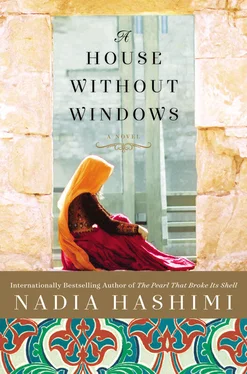“Absolutely.”
“I’d like to speak to you for a moment,” the mullah said.
“Of course, Mullah- sahib, ” Yusuf replied respectfully. “And then we’ll be glad to take Khanum Zeba off your hands and get her back to Chil Mahtab. The judge has given me specific instructions. I’m sure you understand.”
“A moment, young man.”
Asma and the other female guard exchanged a quick look before walking over to the metal fence of the shrine where devotees had tied pieces of multicolored ribbon and even some strips of tattered paper. The guard who had driven them took out his cell phone and began dialing. The mullah led Yusuf back into his quarters. Yusuf’s stomach sank a bit, anxious to leave. He’d brought a bag of chips, a chicken kebab rolled in flatbread, and a bottle of water for Zeba, anticipating that she might be very seriously malnourished.
It had not been a full forty days. The mullah was likely not happy that his treatment was being cut short, and whatever protests he had not lodged with the judge were sure to come Yusuf’s way now. He wondered if he could count on the guards to help him forcibly take Zeba back into custody if push came to shove.
Yusuf stepped into the room and prepared a rebuttal for the mullah’s argument. He was so distracted by his thoughts that he almost didn’t notice Zeba sitting on the floor cushion where he had sat on that first day at the shrine. In front of her was a steaming cup of black tea and two ceramic bowls, one of pine nuts and the other of green raisins.
“Zeba! You’re. . you’re here.” Yusuf’s eyes darted from his client to the mullah who had already taken a seat on another floor cushion. He sat just a few feet away from her, close enough that if he stretched his arm out, his fingertips would touch her. She could have been mistaken for a houseguest.
Yusuf had imagined he would find Zeba starved and unkempt, weakened by exposure. He had counted every day that she had spent in this shrine as a personal failure. He’d thought of her Spartan cell with every forkful of rice he’d brought to his mouth. He’d braced himself, in these nineteen days, for word that she had succumbed to hunger or that she’d descended into a new depth of madness.
“Are you all right?”
Zeba nodded.
“I’ve come to take you back to Chil Mahtab.”
“I know,” she said, stealing a glance at the mullah. “I was told yesterday. I’m ready to leave.”
The mullah cleared his throat and absently thumbed the onyx beads of a tasbeh . He sat with one leg bent and the other stretched straight. He wore a gray cotton tunic and pantaloons. Yusuf noticed, for the first time, his thick salt-and-pepper sideburns, curly patches that thickened along his jaw and gathered in a short beard at his chin. He wondered what this man would look like with a shave and change of clothes.
“Before you go, I want to know what will become of her.”
Yusuf turned his gaze to the carpet. Was there a polite way of telling the mullah it wasn’t any of his business?
“Her case is yet to be decided by the judge,” he answered. “Now if you could tell me what you think of her condition today as compared to her first day here, I’ll gladly take that information back to Qazi Najeeb.”
“I’m a simple man,” the mullah said, his voice melancholy. “The people who come to me are suffering and it is my job to sit with them, to pray over them, and to help them find a path to healing. Their illnesses are burdens to them and to their families. It’s their collective suffering that I work to heal. This woman,” he said, looking at Zeba thoughtfully, “was in bad shape when she first arrived. She had been overcome by evil djinns. They controlled her thoughts and her actions. They were her arms and legs. Since your last visit I’ve prayed with her. I’ve prayed over her. She’s followed the diet that washes the toxins from her body. She’s exorcised the poison from her mind. I think she is much recovered, and, it is worth saying, she was able to do so in fewer than the usual forty days.”
“So you think she’s now of sound mental condition at this point,” Yusuf summarized.
“I think much has changed for her in these few days. I think she has a better understanding of many things.” His eyes were still trained on Zeba, who did not flinch at his description of her progress. She looked up at the mullah, and her lips parted slightly, as if she were about to speak, but no words came out. She clasped her hands together on her lap.
“Zeba Khanum, if you’re ready, then we should be going. Asma and the others are outside waiting on us.”
Zeba nodded again and pressed her palm to the carpet to support herself as she stood. She looked underweight but not deathly so. There was color in her cheeks and light in her eyes, even if she did move like an ungreased joint.
“Do you need help?” Yusuf reached out a hand instinctively, but she shook her head. The mullah watched carefully before he rose from the ground to walk them out.
“Young man,” he said, putting a hand on Yusuf’s forearm. Yusuf turned abruptly. The physical touch had been unexpected. “Fight for her, please. Do your best to defend her, and Allah will reward you. She does not deserve to be punished. She’s a good woman. I wish I could have helped her more.”
Zeba turned around and looked at the mullah. There was a sadness in her posture, not the anger Yusuf had seen when he’d left her.
“You’ve done the best you could,” Zeba said softly. She fixed the head scarf on her head, flipping the loose end over her shoulder gracefully. “I was. . glad to meet you.”
“I will be praying for you,” he said to Zeba, standing just a foot from her. “Just as I prayed for you here, I will continue to pray for you when you leave. God is great. You know what He can do.”
Yusuf felt more like an interloper than Zeba’s counsel. Had Zeba become a believer in the mullah’s methods? Had his prayers affected her so profoundly in these few days? She’d been desperate, and it was quite possible that she grabbed onto his incantations as a drowning soul would reach for a life preserver. Yusuf noted a change in Zeba, a tranquility that hadn’t been there nineteen days ago. Could there be some unearthly potency in this shrine? He shook his head and wondered if he, too, were somehow falling under the mullah’s spell.
He walked out of the door and looked at Zeba expectantly.
“Mullah- sahib, thank you for all you’ve done,” Yusuf said because it was the right thing to say at that particular moment.
The mullah closed both eyes and nodded slightly, a tiny acknowledgment.
Zeba followed Yusuf with heavy steps.
They stood by the car until the guards, seeing them emerge from the house, began trudging back to the vehicle. The mullah leaned against the wooden door, his hands resting just above his belly, with fingers intertwined.
“Good-bye, Padar,” Zeba said softly, her eyes glistening in the sun.
Yusuf stopped short and looked at them both. His jaw went slack, and he cocked his head to the side.
“What did you say?” he asked Zeba, who stood at his side next to the car.
The mullah did not budge but kept his eyes on Zeba’s. With every second that the mullah and Zeba ignored him, Yusuf felt a burgeoning realization that these were not the same two people he’d seen three weeks prior.
“What did you call him, Khanum Zeba?” he asked again, his voice sharper.
“Father,” Zeba whispered, brushing a tear from her left cheek stoically. Any further explanation was cut short by the return of the guards. In a flash, they had all climbed into the silver Toyota, and its four doors were shut in succession.
Her father? Yusuf sat in the front seat, turning the words over in his mind. Did she mean her true father or had he completely brainwashed her into some kind of bizarre devotional relationship? Yusuf resisted the urge to swivel in his seat and press Zeba for an explanation. It was not a discussion he wanted to have with the current audience.
Читать дальше











